DAVE'S DIARY - 7 JANUARY 2019 - STEVE RIPLEY OBITUARY
TRACTORS DRIVER STEVE RIPLEY DIES AT 69
“All across the south/ they've got the boogie bands that sound so fine/ on both coasts they've got the record company machines/ turning out hits on an assembly line/ but in the heart of America we've got the beat/ that's guaranteed to tap your toes/ Oklahoma's got the Tulsa shuffle/ and this is the way it goes?” - The Tulsa Shuffle - Steve Ripley.
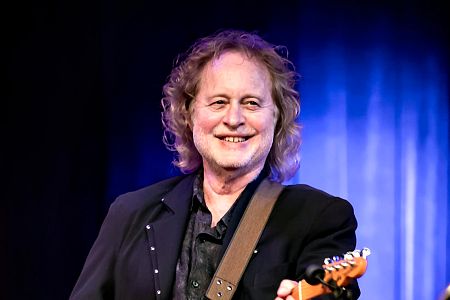 |
Steve Ripley, innovative creator of eclectic Oklahoma country swing band The Tractors, died two days after his 69th birthday at home in Pawnee on January 3 after a battle with cancer that prematurely ended his colourful career.
Ripley won wide exposure on Nu Country FM for The Tractors who recorded seven albums and solo album Ripley.
In 1994 The Tractors took country music by storm with their self-titled debut featuring The Tulsa Shuffle, Thirty Days, Baby Likes To Rock It, Badly Bent, The Blue Collar Rock, Doreen and Trying To Get To New Orleans.
The project was culmination of a quest to blend Ripley's earliest influences - from the western swing of Bob Wills and traditional country of Hank Williams to emergence of Chuck Berry and what Ripley called “the Elvis thing.”
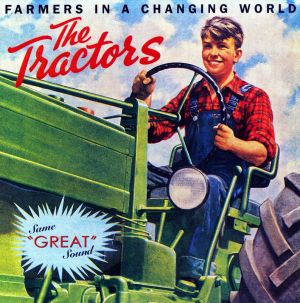 |
The Tractors debut album shocked the world by going platinum faster than any debut album by a country group in history and achieved double-platinum status. It won two Grammy nominations, CMT Video of the Year for smash single, Baby Likes to Rock It and is the top-selling record of all time for a work recorded in Oklahoma. Ripley was also a songwriter, producer, engineer, studio owner, radio host and inventor of the “stereo guitar” favored by fellow musicians Eddie Van Halen, Ry Cooder and Dweezil Zappa.
|
He owned The Church Studio in Tulsa for 19 years, played guitar with Bob Dylan and produced and engineered projects for Leon Russell, J. J, Cale, Roy Clark, Johnnie Lee Wills and many others.
Born Paul Steven Ripley on January 1, 1950 in Boise, Idaho, he grew up on the family's Oklahoma Land Run homestead in Pawnee County.
His earliest musical memory was at three years old listening to his dad enthusiastically singing along to Bob Wills' Roly Poly in the family car, and his most impactful musical memory was hearing Elvis Presley's Heartbreak Hotel blasting from his Aunt Babe's radio when he was six.
Ripley played in bands from junior high through college and worked nearly full-time as a musician while attending Oklahoma State University where he earned a degree in communications.
He discovered his love for recording in the 1960s in Gene Sullivan's Hi Fi Studio in Oklahoma City - same venue where Tulsans J.J. Cale, Leon Russell, and David Gates made some of their first recordings.
He opened his first studio, Stillwater Sound , in the early 1970s.
Ripley was a friend and confidante of many luminaries of rock, country, and Americana music, and was respected through the industry for his gifts as an artist and producer, and for his technical innovations in the world of guitars, microphones and sonic design.
Once, while sitting at George Harrison's recording console at Friar Park, Ringo Starr asked Steve, “Do you know how to run this thing?” To which Steve replied, “Well yeah, I guess I do. You know, it's what I do.”
His lifelong interest in modern musicology was highlighted by his radio series Oklahoma Rock & Roll that explored Oklahoma's vast contributions to music and American pop culture; and most recently, his successful efforts to rescue and preserve the musical archives of his friend and mentor, Leon Russell.
RIPLEY AND MOSES
“Up north in Chicago/ you've got your authentic blues bands/ and way down yonder in New Orleans/ they got a thing they call Dixieland/ all around this whole wide world/ there's one thing that everybody knows/ all God's children love the Tulsa shuffle.” - The Tulsa Shuffle - Steve Ripley.
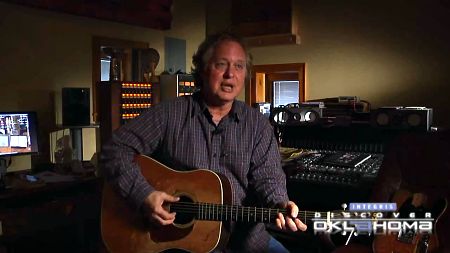 |
His debut 1972 live album Moses was named after his first band - their record label Red Dirt Records put Ripley at the birth of the Oklahoma strand of music that later would be called Americana.
Ripley's role in the origin and legendary support for regional musicians in the genre as one of the patriarchs of Red Dirt music earned him induction into the Oklahoma Red Dirt Hall of Fame .
After a stint writing songs in Nashville, Ripley became a live sound engineer for music legend Leon Russell.
He then moved back to Oklahoma in the late 1970s to work for the Jim Halsey Company and produce critically acclaimed records for Roy Clark/Gatemouth Brown and Johnnie Lee Wills.
Ripley then moved to Burbank, California as a studio engineer for Leon Russell's Paradise Records aiding Russell on many projects including those by JJ Cale and New Grass Revival .
He also played on two J.J. Cale records.
During this period Ripley had the once-in-a-lifetime opportunity to play for one of his biggest musical heroes, Bob Dylan.
His Dylan connection was friend, legendary drummer for the stars and Tulsa native Jim Keltner who was playing with Dylan at the time.
Ripley played guitar on the Dylan album Shot Of Love and jetted off on a world tour in Dylan's band.
In a 2009 Rolling Stone interview Dylan recalled Ripley as one of his favorite guitar band-mates.
Another friendship that emerged from Ripley's time in California was legendary guitarist Eddie Van Halen, with whom he collaborated on his stereo guitar design and started the company Ripley Guitars.
They forged a lifelong friendship and mutual love that lasted until Ripley's final days.
“For more than 35 years I've been fortunate to call Steve Ripley one of my true friends,” says Van Halen.
“Steve is many things. Part genius, part musician, part inventor and many other great things, but my favorite thing about Steve is the wonderful, kind, humble human being he is and always will be. I love Steve with all my heart and am proud to know him.”
RIPLEY BACK TO CHURCH
“I love England - I love the Beatles / the Who and the Rolling Stones / I love Nashville country and Texas Tex-Mex/ and Cajun and Motown soul/ but in the heart of America we got the beat/ that's guaranteed to tap your toes/ Oklahoma's got the Tulsa shuffle.” - The Tulsa Shuffle - Steve Ripley.
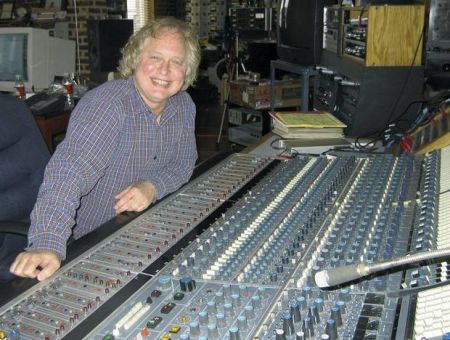 |
In 1987 Ripley, wife Charlene and family moved back to Tulsa and acquired The Church Studio - the legendary recording venue Leon Russell owned in the 1970s.
It became his second home and hub for his large body of creative work - including seven albums for The Tractors and solo album Ripley.
The latter was a departure from Oklahoma Boogie and leaned more toward roots Americana.
Ripley is among Oklahoma artists who have carried the torch of the music originated by Leon Russell and J.J. Cale - music that was called the Tulsa Sound .
In 2005 Ripley and Charlene moved back out to the Pawnee County farm where he was raised, quickly expanding it beyond the small farmhouse to a compound with a guitar shop and recording studio dubbed The Farm from which he hosted his Oklahoma Rock & Roll radio show for the Oklahoma Historical Society .
He continued recording music, including a collaboration with the Red Dirt Rangers titled Ripley and The Rangers , and a full length LP for The Red Dirt Rangers as well.
In 2013, he was hired as an audio archivist, and worked with OKPOP Executive Director Jeff Moore to engineer a collection of unreleased Bob Wills recordings which was later released on vinyl.
Most notably in 2016 OKPOP acquired the Leon Russell archive and Ripley became official Curator of the Leon Russell collection, working as a diligent steward for the legacy of his dear friend and mentor.
Ripley worked restoring, cataloguing, digitizing, and archiving invaluable Leon Russell master tapes for the museum in downtown Tulsa.
His love for this project and Leon kept him going during his final days.
In 2017 Ripley re-visited two of the great passions of his life - his role as a band leader and his love of all things Bob Dylan.
He was asked by the George Kaiser Family Foundation to create a live musical event celebrating the arrival of the Bob Dylan archives that were acquired and relocated to Tulsa and housed in the Bob Dylan Centre.
On A Night Like This was a one-night-only musical revue and saw Ripley leading what he dubbed The House Band Approximately.
It featured a bevy of many legends of Oklahoma music - many new generation Oklahoma voices and talent and the powerhouse vocals of the McCrary Sisters, featuring Regina McCrary, a tour-mate of Ripley's from the Bob Dylan days.
The concert was his final live performance - a tour-de-force of a wide range of the Dylan catalogue.
He is survived by his wife Charlene, children Elvis Ripley and Angelene Ripley Wright, son-in-law Jonny Wright, grandson Mickey Wilder Ripley Wright, and brothers Scott Ripley and Bobby Ripley and their families.
In lieu of flowers, the family requests donations to The Red Dirt Relief Fund that provides a safety net of critical assistance to Red Dirt music people in times of need at reddirtrelieffund.org.
NU COUNTRY RIPLEY 2002 INTERVIEW
RIPLEY REAPS RICHES FROM COCK FIGHTS
“And the kings of earth and the great men/ and the rich men and the mighty men/ hid in the rocks and the den from the wrath of the Lamb/ and said fall on us, no-one can stand/ the seventh angel began to sound, nobody left standing when the deal goes down.” - The Round And Round - Steve Ripley.
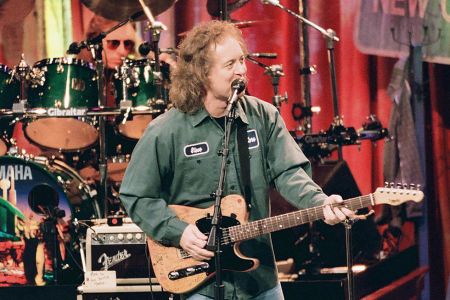 |
Tractors driver Steve Ripley has long harvested hay from his movie-genic mind.
Ripley used elitist comments by Zsa Zsa Gabor about Ferlin Husky in 1958 B movie Country Music Holiday in the 1994 demo that landed his Okie band an Arista deal.
Now, almost a decade later, Steve markets solo debut Ripley' (Boy Rockin'- Shock) via a movie on attempts to ban cock fighting.
Ripley, who released seven albums with The Tractors , wrote music for the period piece starring Wilford Brimley.
“I watched a rough edit of the movie which is built around extensive deal making between the cock fighting underworld and politicians,” Ripley, then 54, told Nu Country after the World Trade Centre bombing.
“I was reading quite a bit from Revelation and all of that started to manifest itself in the lyrics that became the title song for the movie The Round And Round .”
That tune is featured on a disc kicked off by Gone Away - a ruptured romance song riddled with movie metaphors - penned with John Wooley and Tim Dubois (a fellow Okie who signed him to Arista .)
Imagery and grooves, steeped in history, are his strong suit in Night Time Lover, Too Many Borderlines and Oklahoma Blues.
Ripley also performs nuptials of his tune Down Down with Dylan's I Don't Believe You.
The disc ends with A P Carter's No Depression with The Whites on harmony, and his own gospel finale Crossing Over, with The Jordanaires - both from the movie.
Ripley plays guitar, drums, banjo, six string bass and piano but is not exactly a one man band.
He describes himself as the “mad scientist.”
“There is a way of creating an environment,” says Ripley, “where a song, a collection of noises, a record comes to life and takes on a personality all of its own.”
Who are the other creators working for the mad scientist?
Fats Kaplin is on Hawaiian lap steel, mandolin, banjo, cello and string quartet, Willie Weeks shares bass work with Tractor Casey Van Beek; pianists and organists include Glen Mitchell, John Herron, Jim Edwards and Steve's daughter Angelene.
Wife Charlene provides recipes for his web page and his production manager, son Elvis does the booklet cover and daughter Angelene designed the art work.
When The Tractors sampled Hilary Clinton's voice for a hidden track on their 1998 album Farmers in A Changing World they hoped she might protest.
But instead country music loving President Bill upset their tractor cart by writing back with the note “thanks for sharing your music” after he listened to Farmers In A Changing World - a gift.
President Clinton is one of three million Americans with a copy of three big selling albums by the band who tour Australia in August.
“I offered them a chance to say ‘don't do it' but I think he has a few other problems,” Ripley confessed.
“I just lifted Hilary's voice from the TV news and stuck her on the Hale Bop Boogie . She was always talking about this right wing conspiracy, back when the Hale Bop comet came out, and the cult who killed themselves. She said ‘I don't understand this conspiracy. It's like the Hale Bop comet.' She said Hale Bop in such a way that we kept repeating it. I'd like to record Bill in the White House but I don't know if he will be there long enough for me to hook up the equipment.”